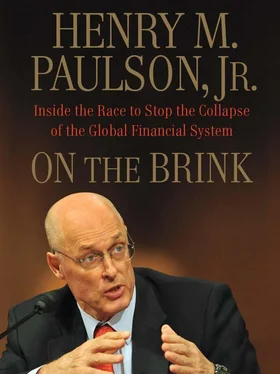Meantime, tension was growing between Jon Corzine and me. I had been named co-chairman and co-CEO that June, and, frankly, the pairing was never right. The structure wouldn’t work for a public company, and I concluded I could not continue to work with Jon as co-CEO. I secured the support of our management committee, and in early January 1999, Corzine’s friend and protégé John Thain, then our CFO, went to talk with him. Then I followed and told Jon that he would need to step aside.
“Hank,” I remember him saying, “I underestimated you. I didn’t know you were such a tough guy.”
But it wasn’t about being tough. It was about what I thought was the right thing for Goldman. Corzine stepped down immediately as CEO and left in May 1999, when Goldman went public, ending 130 years of partnership.
Like many Goldman executives, I worried about what it would mean to the culture and ethos of the firm to be a public company. We worked hard to maintain the cohesiveness and the frankness of the old partnership culture. I was determined to properly align my interests with those of our shareholders. During my final three years as CEO, my bonus was paid entirely in stock. With the exception of charitable giving (including donations to our family foundation), I decided that as long as I remained CEO, I would not sell a single share of the stock I had received in exchange for my partnership interest when we went public, nor would I sell those shares I received for my annual compensation. This emulated the pre-public Goldman Sachs, whose leaders were long-term owners with the vast majority of their net worth invested in the firm.
Those first years were trying ones. We had to contend with the end of the dot-com boom and the subsequent recession, the effects of the 9/11 terror attacks, and the onset of a bear market for stocks. But I think it fair to say that by any measure, we were successful. In the seven years between May 1999 and May 2006, just before I left, the number of Goldman employees (including affiliates) grew from nearly 15,000 to about 24,000. Net earnings of $5.6 billion for 2005 were more than double the pro forma net earnings of $2.6 billion of 1999.
Success notwithstanding, the financial industry had plenty of problems, and we had our share. Much of Wall Street, including Goldman Sachs, got tarred with the scandal over tainted securities research that came to light in 2002. I was concerned about such lapses in judgment, particularly at Goldman Sachs. I knew we could all do better, and I began to speak out.
I soon earned a bit of a reputation as a crusader or at least as a moralist. I wasn’t a wild-eyed reformer, and I had never wanted a microphone. For me the issue was simple: in business, as in life, we should do not just what is legal but what is right. I hadn’t heard anybody state this obvious point, which was what I tried to do when I gave a well-covered speech at the National Press Club in June 2002.
“In my lifetime, American business has never been under such scrutiny,” I said. “And to be blunt, much of it is deserved.”
I was later told that my speech was helpful in passing the Sarbanes-Oxley legislation. These reforms were enacted after a rash of corporate and accounting scandals, most notoriously the collapse of Enron, and created tougher standards for public accounting firms and the management and boards of public companies.
Every now and then I’d chide my colleagues about the dangers of the ostentatious lifestyles I saw among Goldman bankers. I’d get in front of the partners—I was never scripted—and say things like: “You have got to remember something. No one likes investment bankers. You make your life more difficult when you build a 15,000-square-foot house.” Of course I also recognized that for some of our people, the desire to make money was what kept them working so hard and kept Goldman Sachs doing well.
I guess it’s fair to say that the excesses of investment bankers were just an extreme example of conspicuous consumption in a disposable age. Wendy groused about this all the time—people buying things they didn’t need, then casually throwing those things away. Wendy is an avid environmentalist: she carries trash off airplanes to recycle it. She still wears clothes from the early ’70s and uses pots and pans that came from my parents’ basement. We even use the same toaster oven we’ve had since we got married 40 years ago. Why wouldn’t we? It works perfectly well.
Wendy and I share a love of natural landscapes and wildlife, which has led to a strong interest in conservation. We have been active in philanthropic activities, devoted to the stewardship of our natural heritage both here in the United States and globally. For me this has meant serving as chairman of the board of the Nature Conservancy, co-chairman of the Asia Pacific Council of the Nature Conservancy (where, among other initiatives, we worked to establish parks in the Yunnan Province of China), and chairman of the board of the Peregrine Fund, which is dedicated to protecting birds of prey around the world.
By the spring of 2006, Goldman Sachs was enjoying record levels of activity and income, its shares were at an all-time high, and I was not looking to make any change in my life when the possibility of my going to Treasury started being discussed. There were rumors that Treasury Secretary John Snow would be leaving, and one Sunday morning I woke to see a New York Times article with a picture of me and the American flag, suggesting that I would be the next Treasury secretary.
Not long after that, I got a call from Josh Bolten, President Bush’s new chief of staff and a former Goldman executive, to gauge my interest in the job. Goldman was clicking, and I wasn’t eager to leave. I told Josh I couldn’t see doing it, and I used Wendy as an excuse: she did not want to go to Washington, and she was a supporter of Hillary Clinton’s. I also wasn’t sure what I’d be able to accomplish at the end of a second term.
Josh was persistent. He knew that I had been invited to an upcoming lunch on April 20 at the White House in honor of Chinese president Hu Jintao, and he invited me to meet with President Bush then. “The president normally only meets with people when they want to accept,” Josh explained. “But he’d like to visit with you privately in his residence the night before the lunch.”
“Fine,” I said. “I’ll be there.”
A day or so before I was scheduled to go down to Washington, John Rogers, my chief of staff at Goldman, asked me whether I was planning to accept the post.
“Probably not. I can’t think of what he could say to persuade me,” I said.
“You shouldn’t meet with him, then,” said John, who was wise in the ways of Washington. “You don’t tell the president no like that.”
I called Josh immediately and explained that I was not going to see the president after all because I had decided against taking the job.
Wendy and I flew to Washington for the Hu Jintao lunch, and I met beforehand with Zhou Xiaochuan, the Chinese central bank governor, at the headquarters of the International Monetary Fund. He asked to see me alone, and we went off to a room where no one could listen in and where there were no note takers.
“I think you should become Treasury secretary,” he said.
“I’m not going to do it,” I said, without going into the details. I was surprised at how well informed he was.
“I think you’ll be sorry,” Zhou replied. “I am someone who’s spent my life in government. You are a public-spirited person, and I think there’s much you could accomplish in the world right now.”
The lunch at the White House was an impressive gathering. Still, I felt the president was cool with me when I saw him, as was Vice President Dick Cheney, with whom I’d had a good relationship. Someone in the receiving line who was well plugged into the administration said to me, “Hank, you’d have been a great Treasury secretary. And you know there may not be a chance for another Republican for years. Do you know what you’re doing turning this down?”
Читать дальше












